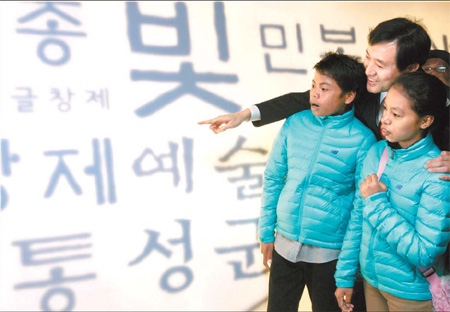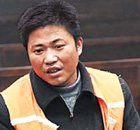Asia-Pacific
Indonesian tribe turns to Korean to save language
(China Daily)
Updated: 2009-12-24 08:26
 |
Large Medium Small |
SEOUL: For members of an Indonesian tribe visiting Seoul for the first time, the winter cold was beyond belief, the high-tech gadgets seemed to come from another world yet the language was eerily similar.
 Seoul city Mayor Oh Se-hoon and visiting students from the Indonesian Cia-Cia tribe look at Korean characters written in a language called Hangeul at The History of King Sejong pavilion in Seoul yesterday. [Agencies] |
South Korea had been a distant country, home to Samsung TVs for the 60,000 members of the Cia-Cia tribe until earlier this year when a Korean woman with a love for her country's writing system convinced them to adapt the Korean script.
The tribe, looking to preserve a fading language that had been passed down orally but not through writing, agreed and since then the tribe has won its way into the hearts of South Koreans, who have rewarded it with teachers, text books and aid.
The odd linkage has been a linguistic coup for South Koreans, who celebrate the written language called Hangeul with a national holiday and see it as a defining element of a culture that has been for centuries in the shadow of neighbors China and Japan.
Several tribe members arrived in Seoul this week for a tour of cultural sights, a brief introduction into the history of Hangeul and a session with mayor of the South Korean capital, Oh Se-hoon, where he pledged exchanges with the people living in and around a town called Bau Bau on the island of Buton.
"It's a little uncomfortable being here. I can read what's written but I can't understand it," Samsir, a teenage boy who began using Hangeul to study the Cia-Cia language a few months ago, said at the event with Mayor Oh.
Something like parental pride filled the room at the event when Cia-Cia teenager Fitriana was called on to read a line in Korean. Middle-aged Korean men in suits mouthed the words as she read and broke into applause when she finished the sentence.
Simple and elegant
Hangeul, a simple yet elegant phonetic alphabet devised by Korean King Sejong about 600 years ago, in theory can be used to write words in almost any language but its limited number of vowel and consonant sounds can often lead to written words being only an approximation of another language's spoken words.
The sounds of Cia-Cia language appear to work well with sounds that can be represented in Hangeul, linguists said.
Lee Ho-young, a Seoul National University linguistics professor helped put together a Hangeul textbook that would help students in the tribe write their language.
"The reading part contains topics from the culture and history of the Cia-Cia and Bau Bau City. This is the first time there has been any written history in the language of the Cia-Cia," Lee said.
The project to have the young write their language has met with some resistance from older Cia-Cia who feel it diminishes the tradition of handing down the language orally. Critics also see a bit of cultural imperialism.
The South Korean government has tried to steer clear of funding the Cia-Cia due to these concerns. But that has not stopped writers on government websites proclaiming the Cia-Cia tribe's move as a victory for Hangeul.
The marriage between the Cia Cia and Hangeul was arranged in large part by Lee Ki-nam, who helped start a institute to celebrate Hangeul and says she is a direct descendant of the ancient king who invented the script.
A professor at the institute told her many tribes in Indonesia do not have written languages and might be persuaded to use Hangeul. She was introduced to the Cia-Cia by the mayor of Bau Bau and went there last year and later worked out an agreement where the tribe would use the Korean text, she said.
"I felt that my mission to help them was to give them a written language," Lee said.
Reuters






